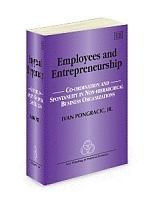Over the last few decades, there has been a great deal of management
literature recommending the removal of firms’ hierarchies and the empowerment of
employees.
Ivan Pongracic, Jr. examines these themes through the lenses of the economic
theory of the firm. Balancing the tendency for management literature to overlook basic
costs and trade-offs of decentralization, and the rigidity of economics that hinders an
appreciation for the real world phenomenon of decentralization, this book arrives at a
realistic middle ground between the two extremes. The dance between hierarchy and employee
empowerment exists in even the most hierarchical firms, and this book explores this often
overlooked dynamic.
The decentralization of decision-making and flattening of managerial hierarchies within
business firms can best be understood as a response to situations where employees hold
knowledge that is superior to that held by firms’ owners and managers. Decentralizing
decision-making in those circumstances allows firms to utilize their employees' superior
personal knowledge, often by encouraging them to act in creative, entrepreneurial ways,
while requiring some reliance on intra-firm spontaneous order processes to co-ordinate the
activities of the employees. This book adds an important component to the standard
economic theory of the firm by exploring the implications of intra-firm knowledge
dispersion. It also explains how firms engage in a process of continuing experimentation
to create an organizational structure that fosters employee creativity and
entrepreneurship.
Scholars in economics, entrepreneurship, organizational studies and management will find
this book a fascinating exploration of firm behavior.
Ivan Pongracic Jr., Associate Professor of Economics, William E.
Hibbs/Ludwig von Mises Chair in Economics, Hillsdale College, US
Table of Contents
Series editor's foreword Peter Boettke Boettke, Peter
Foreword Frederic Sautet Sautet, Frederic
1 Introduction 1
Understanding decentralization developments 4
The pros and cons of decentralization 8
Modern economic theory of the firm and decentralization 15
Outline of the book 16
2 The hierarchical theory of the firm 20
Coase's theory of the firm 21
Williamson's continued development of the Coasian research program 24
3 The knowledge problem in firms 42
The institutional taxonomy 45
The knowledge problem in firms 51
Decentralized decision-making through hierarchical flattening 59
The organizational tradeoff between co-ordination and innovation 68
Foss's critique of intra-firm decentralization 72
Seeking creativity within firms 85
Conclusion 87
4 Spontaneous order in decentralized firms 92
What motivates employees? 93
Spontaneous order within decentralized firms 103
Conclusion 109
5 Employees as creative agents 114
Entrepreneurship and creativity 114
The process of entrepreneurial decision-making and judgment derivation 116
Creativity and imagination 119
Creativity, judgment and delegation 121
Conclusion 123
6 Conclusion 127
Bibliography 132
Index 139
160 pages, Hardcover
Księgarnia nie działa. Nie odpowiadamy na pytania i nie realizujemy zamówien. Do odwolania !.


